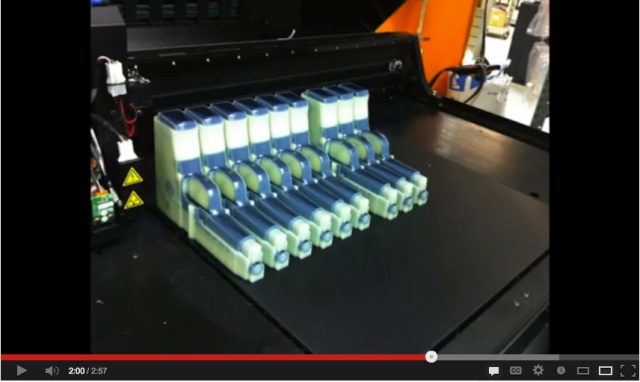
A still from Cody Wilson’s latest video shows this example of 3D-printed handguns (these are mock-ups pictured, not actual handguns).
Defense Distributed, the 3D-printing gun activist group, has secured a settlement with the Department of State that will enable it to legally distribute its CAD files of firearms on its DEFCAD website, putting an end to a years-long lawsuit.
The group says it will resume publication on August 1, 2018, more than four years after its files were first removed.
“It’s just now black letter law that you can traffick in this information,” Cody Wilson, the group’s founder, told Ars, noting that substantially not much will change given that the files have been available on torrent sites for years.
“Basically the spin is different now,” he said. “There isn’t the need for the subterranean Dark Web. It can be done in the clearnet and in the light of day and reputable places.”
The settlement, which was signed in April but only took effect in late June, says that the DEFCAD files in question are “approved for public release (unlimited distribution) in any form and are exempt from the export licensing requirements of the [International Traffic in Arms Regulations].”
The State Department has also agreed to pay Defense Distributed’s legal fees, which total nearly $40,000.
The federal civil suit has its origins over five years ago when Cody Wilson and his group, Defense Distributed, published designs for the “Liberator,” the world’s first 3D-printed handgun.
Within months, Defense Distributed received a letter from the United States Department of State’s Office of Defense Trade Controls Compliance stating that 10 files, including the designs of the Liberator, were in violation of the ITAR. This is despite the fact that these files had already been downloaded hundreds of thousands of times and continue to circulate online.
Defense Distributed removed the files for fear of criminal and civil liability. The group then re-submitted a “commodity jurisdiction request” to the Department of State, which the company hoped would clear the way for the publication of the files. After waiting for two years, Defense Distributed, along with the Second Amendment Foundation, sued the Department of State and argued that the government’s action constituted “prior restraint”—preventing publication before it occurs. In the United States, the Supreme Court has generally rejected the concept of prior restraint.
Robert Clifton Burns, an export lawyer who is not affiliated with this case, told Ars that a change of the relevant laws was inevitable and that, within months, experts expect that any American will be able to publish such files as they see fit.
“That putting something on the Internet is an export to the entire world is ridiculous,” he said.
Wilson told Ars that these days he’s making money selling Ghost Gunners—milling devices designed to turn 80-percent lower receivers into functional and untraceable weapons—and has 18 employees in his Austin, Texas, office.
“Payroll, man!” he joked, adding that he still goes into his job “like anybody else.”
“The margins there are enough to support an entirely annexed software company.”
Wilson hoped that, after August 1, there would be a new community of CAD nerds that could help create his ultimate vision of previously unimagined firearms.
“If you build a critical mass of enough of a stock of these files and enough of a community, that is what you’ll end up seeing,” he said.
Meanwhile, lawmakers are continuing to try to battle Wilson and his ilk in different ways.
On June 12, New Jersey Attorney General Gurbir S. Grewal sent a letter to ghost gun manufacturers, ordering them to “stop selling and advertising unregistered and unserialized assault weapons to New Jersey residents.”
via Ars Technica
3D-printed gun lawsuit ends after 3+ years—in gun publishers’ favor